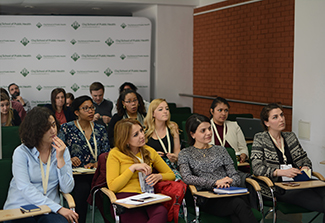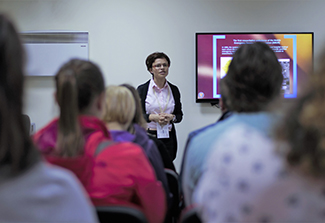Improving traumatic injury care in Georgia, Armenia and Moldova
May/June 2024 | Volume 23 Number 3
 Photo courtesy of Diana DulfStudents at the iCREATE summer school in Cluj, Romania.
Photo courtesy of Diana DulfStudents at the iCREATE summer school in Cluj, Romania.
The
Increasing Capacity for injury Research in EAsTern Europe (iCREATE) grant emphasizes translation across three-related cultures. Led by the University of Iowa (UI) and Babes-Bolyai University (BBU) of Romania, the program aims to improve acute injury treatment while expanding on previous capacity building efforts in Georgia, Armenia, and the Republic of Moldova. This initiative is vital given that all three upper middle-income countries have lacked scientific research focusing on injuries, resulting in critical gaps in evidence-based information. Primary investigator Dr. Cara Hamann, an associate professor at UI, highlighted the political and economic ties linking the three nations. “Learning to overcome the challenges these countries face makes the work they are doing more relevant and more easily translatable to other former Soviet Union countries,” said Hamann.
Co-investigator Dr. Nino Chikhladze, a professor at Georgia's Ivane Javakhishvili Tbilisi State University (TSU), is well acquainted with these transnational bonds. The start of her career coincided with the collapse of the Soviet Union. Widespread socio-economic difficulties accompanied these political developments. Significant changes during that period included “the reformation of the healthcare system and the establishment of the public health system,” said Chikhladze. Despite the turmoil, she saw “an opportunity to make a positive impact on the health and well-being not only of individual patients but also the population of Georgia as a whole.”
During the Soviet era, medical services and general health care had “primarily focused on infectious disease prevention and treatment of noncommunicable diseases, rather than prevention,” she said. After Georgia gained independence from the Soviet Union, a new demand for experts able to lecture on the health care system and public health issues inspired Chikhladze to pursue public health science and education. Over time, prevention of non-communicable diseases drew her attention. “Since becoming part of the iCREATE project, my research interest is mainly in traumatic injuries,” said Chikhladze. "I know our input is important for the country and that is very attractive and really, really important."
Shared shortcomings, common goals
iCREATE, originally led by Dr. Corinne Peek-Asa (University of California, San Diego) and started in 2005, incorporates core curricula related to injury into PhD- and Masters-level public health programs in partner institutions in Georgia, Armenia, and Moldova, while initiating experiential learning projects in the areas of road traffic injury, acute care, and violence against women and children. Hamann noted, “violence is one of the leading causes of injuries and death globally and also in our partner countries (even if not well-documented), so it is an important topic to include.” As part of iCREATE, TSU students attend programs and a summer school organized at BBU, while mentors from both UI and BBU supervise their projects.
After receiving training from iCREATE for almost a decade, BBU became a collaborator on the grant in 2016. Now, they facilitate the implementation of the project in Eastern Europe. Co-principal investigator Dr. Diana Dulf of BBU said, “This type of continuous funding from NIH is a great opportunity to build capacity in research over the long term and support the future leaders in the field of violence and injury prevention in other regions of the world.” During the program's initial funding cycle, 40 MPH students and 9 PhD students received training, while an additional 43 novice researchers were mentored on experiential learning projects.
In pursuit of its goals, the project has established an eight-hospital emergency department trauma registry plus an NIH-funded prospective brain injury registry. Hamann explained: “The registries are very important because they allow for examination and calculation of the burden of traumatic injuries in our partner countries, which was not possible prior to their creation.” She noted that data quality and access is a challenge in the three nations. “Without data it is hard to understand the burden of different types of injuries or how to target prevention efforts toward the top causes of injuries and injury-related deaths.”
As a co-investigator on the project, Chikhladze's responsibilities include supervising procedures related to human subject protections in Georgia; complying with TSU regulations; and organizing TSU symposia and summer school. Chikhladze said, “TSU has a long history of collaboration with BBU on multiple educational projects involving Armenia and Moldova universities. Consequently, our Romanian partners were well-aware of the research shortcomings shared among our three countries.”
 Photo courtesy of Diana DulfDr. Melinda Gal, former Fogarty Global Health trainee, lectures to a summer school class in Cluj, Romania.
Photo courtesy of Diana DulfDr. Melinda Gal, former Fogarty Global Health trainee, lectures to a summer school class in Cluj, Romania.
Publications and potential policy changes
Chikhladze said collaboration with universities in the U.S. and Romania has been vital. The iCREATE partners “share a range of perspectives and strategies aimed at strengthening the ability of individuals and communities to prevent and respond to injuries and violence effectively,” she said. In their earliest research, the collaborators observed several shared epidemiological characteristics across various types of injuries, including traumatic brain injuries (TBIs), falls, and road traffic injuries, among the three countries. They also published analyses of data drawn from Georgia’s National Center for Disease Control and Public Health database. These comprehensive early studies provided baseline information and data on the main features of injuries, groups at high risk, and general injury trends in Georgia.
“We have now progressed to prospective studies. The comparison of findings from these studies will provide insights into cultural differences in behaviors and risk factors,” said Chikhladze. One hospital-based study of TBI in Georgia published in
Risk Management and Healthcare Policy examined data from Tbilisi’s largest hospital. “Despite limitations, the study gives insight into the burden and management of TBI in Georgia and provides evidence-based information for policy makers.” As the first author of another study conducted at a national medical center, Chikhladze found that unintentional falls accounted for over half of TBI-related hospitalizations (56.2%), while road traffic injury, the second most prevalent cause of TBI-related hospitalizations, mostly occurred among males (63.9%). “Our findings closely align with studies conducted in Europe and the U.S., indicating that falls are a primary cause of TBIs in numerous countries,” said Chikhladze. This work has significant public health implications, she said. “By disseminating this information, we can increase public awareness about the importance of fall prevention measures. Moreover, this evidence can catalyze the development of preventive strategies at the national level, including targeted educational campaigns and environmental modifications.”
The team is expanding its public health focus with forthcoming articles about falls among the elderly and pediatric burns as part of the acute care research portfolio. Meanwhile, Chikhladze is thankful, on behalf of TSU staff and students, to her colleagues at BBU and UI for their continuous support and fruitful partnership. “Collaborative efforts are crucial in preventing injury and violence and improving the health and well-being of the population of Georgia.”
More Information
Updated June 21 2024
To view Adobe PDF files,
download current, free accessible plug-ins from Adobe's website.
Related Fogarty Programs
Related World Regions / Countries
Related Global Health Research Topics